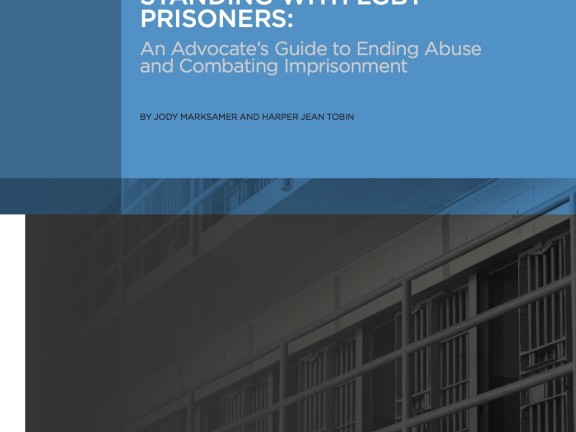Published April, 2014
Standing with LGBT Prisoners: An Advocate’s Guide to Ending Abuse and Combating Imprisonment, Jody Marksamer and Harper Jean Tobin, the National Center for Transgender Equality (2014)

Discrimination and profiling by police have led to a disproportionately large number of LGBT people being incarcerated. Family rejection, homelessness and poverty make LGBT youth especially vulnerable not only to arrest but also physical and sexual assault by police.
According to a federal study, prison inmates who identify as “non-heterosexual” are three times as likely to be sexually assaulted as other prisoners. A similar study in California found that those who identify as transgender are thirteen times more likely to be sexually abused while in prison. And LGBT prisoners are subject to abuse by prison authorities as well, including prolonged solitary confinement and denial of appropriate medical care.
Standing with LGBT Prisoners serves as an introduction to a range of issues that affect LGBT people behind bars and a toolkit to help activists advocate for policies that will protect the safety, health, and rights of all LGBT people who are incarcerated. It is designed to facilitate working with local or state corrections or detention agencies to develop and implement more just and humane policies toward LBGT people.
Topics covered include prisoner intake, identification and risk assessments; recommendations for meeting safety and privacy needs of transgender inmates; medical and mental health care; staff training and sexual abuse prevention, detection, and response. The toolkit also includes several samples of guidelines and forms used by police departments and corrections facilities as well as a summary of US Justice Department standards for the protection of LGBT inmates required by the National Prison Rape Elimination Act (PREA).
Copyright Information: CHLP encourages the broad use and sharing of resources. Please credit CHLP when using these materials or their content. and do not alter, adapt or present as your work without prior permission from CHLP.
Legal Disclaimer: CHLP makes an effort to ensure legal information is correct and current, but the law is regularly changing, and the accuracy of the information provided cannot be guaranteed. The legal information in a given resource may not be applicable to all situations and is not—and should not be relied upon—as a substitute for legal advice.